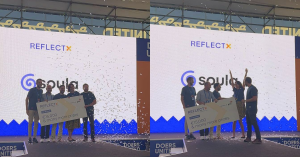The war on Ukraine has caused thousands of terrified refugees to flee to neighboring countries in Central and Eastern Europe. 5 million refugees are expected to flee Ukraine. Around the world, UNHCR estimates 84 million people have been displaced by mid 2021, including 26.6 million refugees who have left their homes due to conflict or persecution. And while technology cannot solve displacement directly, it can help address some essential needs and improve the lives of refugees.
In the short term, refugees are looking to reach a safe destination, but often lack access to valuable information on where to ask for help and how to prepare. In the mid- to longer-term, many refugees don’t get easy access to the labor market and the banking system, rendering their future uncertain.
The Recursive took a closer look at how tech companies in Central and Eastern Europe are addressing the pressing needs of refugees, how they responded following the recent conflict in Ukraine, and how to access their solutions.
How technology is deployed to assist refugees
Up-to-date information and accomodation
The Code for Romania Association responded very fast to the Ukraine conflict. The civic and social organization was inspired by the Code for America movement and the global Code for All network. Since 2016, the team of volunteering developers, social scientists, designers and communication specialists is placing digital solutions at the heart of solving societal issues.
Back at the beginning of the COVID-19 pandemic, Code for Romania started a Task Force mechanism, offering solutions that helped reduce fear and insecurity, such as a platform with up-to-date information on the evolution of infection cases and the vaccination program.
Presently, the team has taken the same approach to make critical information available to the civil society in Ukraine and the Republic of Moldova, as well as the local and central authorities that can help mitigate the effects of the war and respond to the critical needs of refugees.
“It is imperative that the Romanian civil society come to the aid of our neighbors, out of respect for freedom, democracy and the values that are currently eroded in the neighboring country. We stopped our usual activity in order to focus the entire attention of the Code and Romania team and our community of volunteers on solutions that would diminish the effects of the war,” shares Bogdan Ivanel, Co-founder and CEO of Code for Romania.
One of these solutions is Dopomoha, a digital information and support platform for Ukrainian people who need support from Romania. It was created in partnership with the Department of Emergency Situations of the Ministry of Internal Affairs, the UN Refugee Agency, and the International Organization for Migration and the Romanian National Council for Refugees.
The platform answers all critical questions regarding procedures necessary to cross the border, receive asylum, accommodation and other resources available. The information is available in Romanian, Ukrainian and Russian. A help-line in Ukrainian language is also available.
Other solutions include Roof, a platform for accommodation registration and management for refugees; Resource and Volunteer Management, already in use by the Department of Emergency Situations in Romania (DSU) for better resource management, and Who’s Who, a mapping of the institutions actors that can help in this emergency situation.
Elsewhere in the region, Refugee.Info is another nonprofit project that aims to offer up-to-date critical information to refugees and asylum-seekers. Refugee.Info is now available in Greece, Italy, and the Balkans. The project is mainly present on social media, where it shares up-to-date information about the local contexts. People can reach out for further information on the Facebook page or Whatsapp.
Inclusion in the labour market and skill training
One project dedicated to helping refugees in the longer term is Transformify’s Rebuild Lives program. Transformify, headquartered in London and founded by a Bulgarian team, offers solutions to businesses of all sizes aimed to help them optimize hiring and payment of employees, freelancers, and remote workers.
“Refugees leave war zones and move overseas having no safety net or source of income. It takes months, and sometimes even years, to receive asylum status. Even after they receive it, it does not necessarily guarantee employment rights. Being unemployed for a long time leads to losing skills and competencies and diminishes the chances of being hired once they are granted employment rights,” founder and CEO Lilia Stoyanov tells us.
The company built the Rebuild Lives program in 2016 to connect refugees and economic migrants with companies looking to hire them. It also expands their access to finances, through options such as secure payment into a virtual account linked to a prepaid card in the absence of a bank account, and easy cash withdrawals.
On the other hand, they use machine learning algorithms to help recruiters hire the right people fast. The program is financed through the subscription fees charged to businesses, which vary based on the volume of money transferred.
“In essence, Transformify helps businesses hire displaced people compliantly. In particular, we can help Ukrainian refugees register as self-employed/ Individual Entrepreneurs in Ukraine and work via Transformify for any business across the globe taking care of compliance, billing and payments,” Lilia explains.
For Ukrainian refugees, registering as self-employed in Ukraine would allow them to provide services compliantly and pay taxes until they receive asylum and work permits in the new country of residence. Transformify leverages its proprietary workforce management system to fully automate the billing and payments to all service providers. More guidance here.
Transformify further works as a Company-as-a-service (CaaS), taking a mediator role when it comes to invoicing and payments.
“With this service, business clients receive invoices from only one vendor – Transformify, instead of dealing with numerous service providers, collecting invoices, etc. There is no need for the businesses to set up hundreds or even thousands of refugees as suppliers in their vendor master data, collect invoices from them, transfers payments and reconcile them all.
The same is applicable to the refugees – they provide services to Transformify and self-billing invoices are automatically issued on their behalf. They are not expected to know how to issue a tax-compliant invoice,” Lilia adds.
Founded in Bulgaria, Humans in the Loop is another community built around the mission of helping conflict-affected people join the labor market. It works through a hybrid model: a for-profit company which provides employment opportunities to people in need, and a non-profit foundation which offers training programs to upskill them and support them in their career development.
Essentially, the company employs and trains refugees to collect and provide data annotation services to the computer vision industry. Employees perform manual labeling and verification to train machine learning models in areas such as health care, autonomous driving, or robotic vision. This is a type of labor that does not require previous education or professional skills, opening up opportunities to anyone in need to earn a living. To date, Humans in the Loop has built and trained a workforce of more than 250 conflict-affected people.
“Our current programs in Bulgaria are open to all refugees and as Ukrainian families are coming into the country we are able to include them in all programming. This includes career counseling – discussing their professional skills and helping them to find a suitable job in Bulgaria; IT and English skills training, and paid freelance projects, so that they are able to cover their expenses (very suitable for people without previous professional experience),” Iva Gumnishka, founder and CEO of Humans in the Loop shares.
Elsewhere in Europe, Techfugees, an international organization co-founded by TechCrunch Editor-at-large Mike Butcher, further organizes an inclusion program that equips displaced people with digital skills and open access to work opportunities in the tech sector.
Their Digital Corridor program, started in 2021, offers remote work and professional resettlement to refugees through an apprenticeship scheme, digital upskilling in data labeling, as well as professional English, IT and soft skills to find remote work opportunities, They also offer job matching service for software developers looking to leave a crisis affected country.








